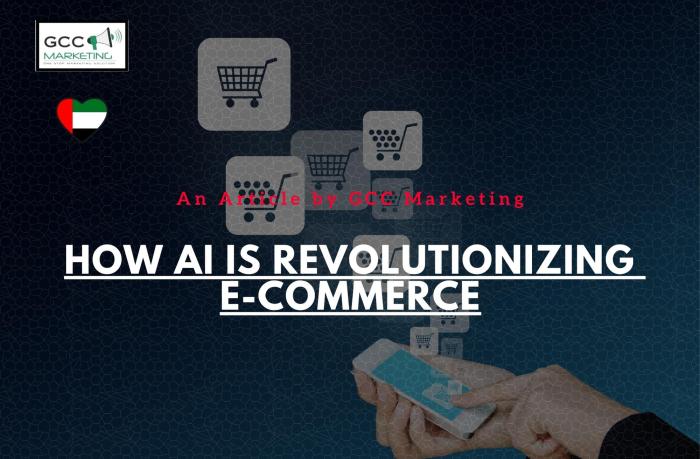Exploring the dynamic landscape of ecommerce personalization through the lens of AI revolutionizes the way businesses connect with their customers. From tailored product recommendations to personalized email marketing, the impact of AI is reshaping the online shopping experience in unprecedented ways.
Delving deeper into the realm of AI-powered strategies, we uncover the intricate web of algorithms and technologies driving this transformation.
Importance of AI in Ecommerce Personalization

AI plays a crucial role in enhancing customer experience in e-commerce by providing personalized recommendations and product suggestions based on customer data analysis.
Enhancing Customer Experience
AI algorithms analyze customer data such as browsing history, purchase behavior, and demographics to create personalized recommendations tailored to individual preferences. This level of personalization enhances the overall shopping experience for customers, making it more convenient and enjoyable.
Increasing Sales
By leveraging AI, e-commerce platforms can increase sales through personalized product suggestions. AI algorithms can identify patterns in customer behavior and preferences to recommend products that are highly likely to be of interest to each individual shopper. This targeted approach not only improves conversion rates but also fosters customer loyalty by showing that the platform understands and caters to their needs.
AI-Powered Product Recommendations

AI-powered product recommendations are transforming the way e-commerce platforms engage with customers by leveraging machine learning algorithms to analyze customer behavior and preferences. By tracking customer interactions, such as past purchases, browsing history, and items added to cart, AI algorithms can predict what products a customer is likely to be interested in and recommend them in real-time.
Examples of Successful E-commerce Platforms
- Amazon: One of the pioneers in using AI for product recommendations, Amazon’s recommendation engine analyzes customer data to suggest items similar to what the customer has viewed or purchased.
- Netflix: While primarily a streaming service, Netflix also utilizes AI to recommend movies and TV shows based on a user’s viewing history and preferences.
- Sephora: This beauty retailer uses AI to offer personalized product recommendations based on a user’s skin type, color preferences, and previous purchases.
Benefits of AI-Powered Product Suggestions
- Increased Customer Engagement: By offering personalized product recommendations, e-commerce platforms can enhance the shopping experience for customers, leading to higher engagement and conversion rates.
- Improved Customer Satisfaction: AI-powered product suggestions help customers discover new products tailored to their preferences, leading to higher satisfaction and loyalty.
- Boosted Sales: With relevant product recommendations, e-commerce platforms can increase cross-selling and upselling opportunities, driving revenue growth.
Personalized Email Marketing with AI
AI technology plays a crucial role in revolutionizing email marketing campaigns for e-commerce by providing a personalized touch to each communication. Through the use of AI tools, businesses can segment their email lists effectively and tailor messages to target specific customer segments, ultimately leading to higher engagement and conversions.
AI-Powered Email Segmentation
- AI tools like customer segmentation algorithms can analyze customer data to categorize subscribers based on their behavior, preferences, and purchase history.
- By segmenting email lists, businesses can send targeted messages to different customer groups, ensuring that the content resonates with each segment’s unique needs and interests.
- Dynamic content personalization can be achieved through AI, allowing for customized product recommendations and special offers based on individual customer profiles.
Effectiveness of AI-Driven Email Campaigns
- AI-driven personalized email campaigns have shown to significantly increase open rates, click-through rates, and ultimately, conversions.
- Personalized email content that is relevant to the recipient’s preferences and past interactions with the brand can create a strong connection and drive customer loyalty.
- AI-powered product recommendations in emails have been proven to boost sales and encourage repeat purchases by suggesting items that align with the customer’s interests and shopping behavior.
Enhanced Customer Service through AI
AI technology has significantly transformed customer service in e-commerce by providing personalized interactions that enhance the overall shopping experience for consumers. Through the use of AI-powered chatbots, online retailers can offer tailored assistance to customers, ultimately leading to improved customer satisfaction and loyalty.
AI Chatbots Providing Personalized Assistance
AI chatbots are revolutionizing customer service in e-commerce by offering personalized assistance to online shoppers. These chatbots are programmed to analyze customer behavior, preferences, and past interactions to provide relevant product recommendations, answer queries, and offer support in real-time. For example, chatbots can suggest products based on a customer’s browsing history or help with order tracking and returns, creating a more personalized and efficient customer service experience.
- AI chatbots can engage with customers 24/7, providing instant assistance and support at any time of the day.
- By leveraging machine learning algorithms, chatbots can continuously improve their responses and recommendations, ensuring a more accurate and personalized interaction with each customer.
- Personalized assistance from AI chatbots can help customers navigate through the online shopping process more effectively, leading to higher conversion rates and increased sales for e-commerce businesses.
Advantages of Using AI for Customer Service
Implementing AI for customer service in e-commerce offers numerous advantages that contribute to enhanced customer satisfaction and loyalty. AI technology enables online retailers to provide proactive support, personalized recommendations, and efficient problem-solving, ultimately leading to a more seamless shopping experience for customers.
AI-powered customer service can reduce response times, resolve issues faster, and offer personalized solutions that cater to individual customer needs, leading to higher customer satisfaction levels.
- AI-driven customer service helps businesses scale their support operations without compromising on the quality of service, ensuring consistent and personalized interactions with customers across various touchpoints.
- By automating routine inquiries and tasks, AI chatbots free up human agents to focus on more complex issues and provide high-touch customer service when needed, creating a balanced and efficient customer support system.
- Through data analytics and machine learning, AI can identify trends, predict customer preferences, and personalize interactions based on individual behavior, leading to more targeted and effective customer service strategies.
Wrap-Up
In conclusion, the fusion of AI and ecommerce personalization opens up a world of possibilities for businesses striving to create meaningful connections with their target audience. By harnessing the power of AI, companies can elevate customer engagement, drive sales, and ultimately enhance the overall online shopping journey.
Questions and Answers
How does AI enhance customer experience in e-commerce?
AI analyzes customer data to provide personalized recommendations, creating a more tailored shopping experience.
What are the benefits of AI-powered product suggestions?
AI-powered suggestions increase customer engagement by offering relevant recommendations based on user behavior.
How can AI personalize email marketing campaigns?
AI tools segment email lists for targeted messaging, leading to more effective and personalized campaigns.
What advantages does AI offer for customer service in e-commerce?
AI chatbots provide personalized assistance to online shoppers, improving overall customer satisfaction through personalized interactions.



